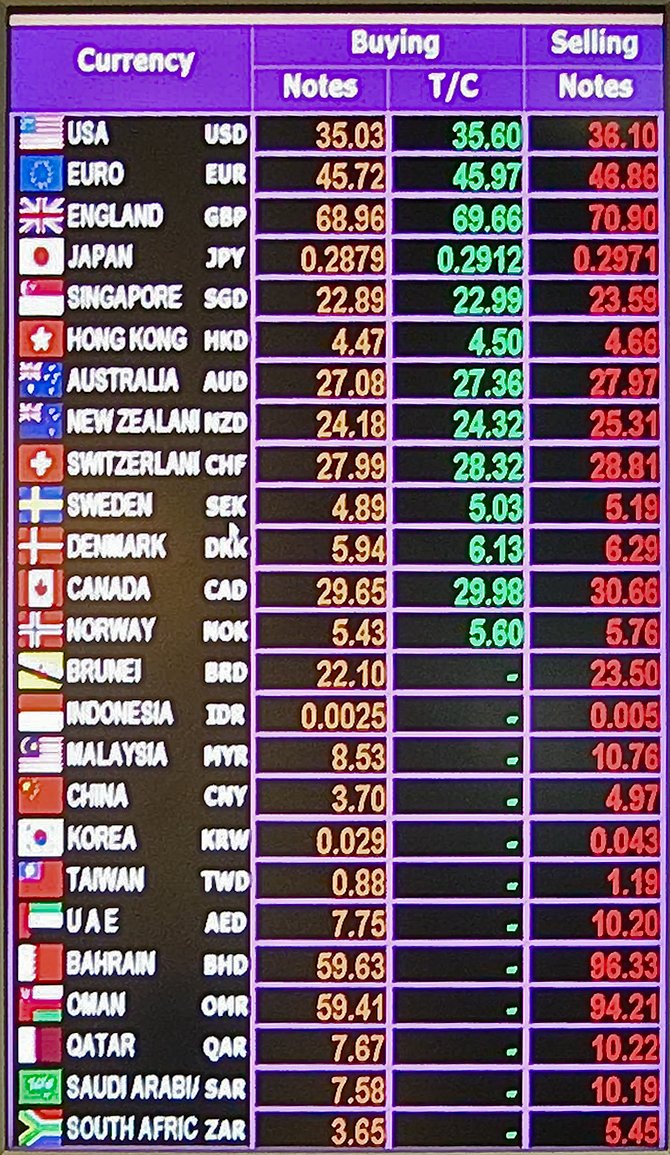
When we talk about the ‘perbandingan nilai tukar mata uang suatu negara dengan negara lain disebut’, we refer to the foreign exchange rate or currency comparison. This comparison plays a crucial role in global trade and economics, influencing investment decisions and travel costs.
Understanding how one currency measures against another helps individuals and businesses make informed decisions. Whether you’re planning a trip abroad or investing in foreign markets, knowing these exchange rates is essential.
Join us as we delve deeper into the significance of currency comparison and its impact on daily life and global affairs.
“`html
Perbandingan nilai tukar mata uang suatu negara dengan negara lain disebut
When considering traveling, doing business, or investing in foreign markets, understanding currency exchange rates becomes crucial. The term “perbandingan nilai tukar mata uang suatu negara dengan negara lain disebut” refers to the comparison of exchange rates between one country’s currency and another’s. This concept plays a vital role in various aspects such as trade, investment, and economic stability. In this article, we will dive deep into the significance of currency exchange rates, how they are determined, factors affecting them, and why they matter to you as an individual or a business.
What is Currency Exchange Rate?
A currency exchange rate is the price of one currency in relation to another. It indicates how much you can exchange one currency for another. For instance, if the exchange rate between the US Dollar (USD) and the Euro (EUR) is 1.10, it means that 1 USD can be exchanged for 1.1 EUR.
Types of Exchange Rates
- Floating Exchange Rate: This type fluctuates based on the foreign exchange market. Supply and demand factors primarily drive floating rates. Countries like the United States and the Eurozone use floating rates.
- Fixed Exchange Rate: In a fixed exchange rate system, a country pegs its currency to another major currency, like the US Dollar. This creates stability but requires the country to maintain large reserves of the foreign currency. For example, the Hong Kong Dollar is pegged to the US Dollar.
- Managed Float: Some countries employ a managed float system where they allow their currency to fluctuate but intervene as necessary to stabilize their economy. This is common in countries like India.
Why Compare Currency Exchange Rates?
Comparing exchange rates helps you understand the relative value of currencies. Here are some reasons why this comparison is essential:
- Travel Planning: Understanding exchange rates helps travelers budget their expenses in foreign countries.
- International Trade: Businesses involved in importing and exporting need to consider exchange rates to set prices and manage costs effectively.
- Investment Decisions: Investors must analyze exchange rates to gauge the potential return on investments in foreign markets.
- Economic Indicators: Governments and economists analyze exchange rates to assess economic health and make policy decisions.
Factors Influencing Currency Exchange Rates
Several factors influence the value of a currency, affecting its exchange rate with others. Understanding these factors can help you interpret currency movements more accurately.
1. Interest Rates
The interest rate set by a country’s central bank impacts the currency’s value. Higher interest rates offer lenders a higher return relative to other countries. Thus, an increase in interest rates often leads to an appreciation of the currency.
2. Inflation Rates
Low inflation rates often correspond with a rising currency value. When a country experiences lower inflation than its trading partners, it can lead to increased purchasing power and a stronger currency.
3. Economic Indicators
Strong economic indicators such as GDP growth, employment rates, and manufacturing output can boost investor confidence, leading to currency appreciation.
4. Political Stability
Currencies from politically stable countries tend to attract more foreign investments, thereby increasing demand and value for those currencies. Conversely, political instability can lead to currency depreciation.
5. Speculation
Traders’ perceptions and speculative activities can cause fluctuations in currency exchange rates. If investors believe a currency will strengthen, they will buy more of it, increasing its value.
How to Compare Exchange Rates
To compare exchange rates effectively, follow these steps:
- Identify Your Currencies: Determine which currencies you need to compare, such as USD to EUR or JPY to GBP.
- Check Reliable Sources: Use trustworthy financial news websites, banks, or foreign exchange platforms to find current exchange rates.
- Understand the Context: Consider current economic conditions, recent news, and market trends that could affect the exchange rates.
- Utilize Conversion Tools: Many online converters can quickly provide you with the equivalent amounts between two currencies.
The Role of Banks in Currency Exchange
Banks play a crucial role in currency exchange. They set exchange rates based on their internal policies and the market. Here’s how the process typically unfolds:
1. Buying and Selling Currencies
Banks buy and sell currencies at the rates they set, which may include a margin over the market rate.
2. Currency Conversion Services
Most banks offer currency conversion services for travelers and businesses. They often charge a fee or provide a lesser exchange rate compared to the market rate.
3. Foreign Currency Accounts
Some banks allow customers to hold accounts in foreign currencies, making it easier for frequent travelers or businesses engaged in international trade to manage their funds.
Using Currency Exchange Rate Data
Currency exchange rate data can be valuable for various purposes. Here’s how you can use this data:
- Budgeting for Travel: If you know that a currency will likely strengthen, you can plan to exchange your money at a more advantageous rate before you travel.
- Assessing Investment Opportunities: Investors can analyze currency trends to make informed decisions about foreign stocks or bonds.
- Making Informed Purchases: If you plan to buy products from another country, knowing the exchange rate can help you understand the real cost of your purchases.
Practical Tips for Currency Exchange
Here are some practical tips for dealing with currency exchange:
1. Exchange Rates May Vary
Always check multiple sources for exchange rates, as they can vary from one provider to another.
2. Avoid Currency Exchange at Airports
Airports often have less favorable exchange rates. If possible, avoid exchanging money at these locations.
3. Use Credit Cards Wisely
Using credit cards abroad can sometimes yield better rates than cash exchanges, but be aware of foreign transaction fees.
The Impact of Technology on Currency Exchange
Technological advancements have significantly influenced how people exchange currencies. Here are some of the ways technology has changed the landscape:
1. Online Currency Exchange Platforms
Online platforms allow users to exchange currencies at competitive rates, often lower than traditional banks offer. This accessibility benefits travelers and businesses.
2. Mobile Apps
Mobile applications enable users to track exchange rates in real time, making it easier to make informed decisions on the go.
3. Cryptocurrency and Digital Currencies
The rise of cryptocurrencies adds a new layer to currency exchange. People are increasingly looking at digital currencies as alternatives to traditional currencies.
In summary, the comparison of exchange rates—“perbandingan nilai tukar mata uang suatu negara dengan negara lain disebut”—is essential for anyone who engages in international finance, whether for personal travel or business transactions. Understanding how exchange rates work and what influences them can empower you to make smarter financial decisions. As the global economy continues to evolve, staying informed about currency exchange will become even more important for consumers and businesses alike.
“`
PERBANDINGAN NILAI MATA UANG ASING DENGAN MATA UANG DALAM NEGERI DISEBUT? #shorts
Frequently Asked Questions
What influences the exchange rate between two currencies?
The exchange rate between two currencies is influenced by various factors, including interest rates, inflation rates, economic stability, and geopolitical events. Changes in supply and demand for the currencies in foreign exchange markets also significantly impact the exchange rates. For example, if a country raises its interest rates, its currency may strengthen due to increased investment flows seeking higher returns.
How do exchange rates affect international trade?
Exchange rates play a crucial role in international trade by determining the relative costs of goods and services between countries. A stronger currency makes imports cheaper and exports more expensive, while a weaker currency has the opposite effect. This fluctuation can influence a country’s trade balance, affecting economic growth and trade agreements.
What is the difference between fixed and floating exchange rates?
Fixed exchange rates are set by a government or central bank at a particular level against another currency or a basket of currencies. In contrast, floating exchange rates fluctuate based on market forces of supply and demand. Countries with fixed rates may use reserves to maintain their currency’s value, while those with floating rates allow the market to determine the value, leading to more volatility.
How does currency devaluation impact a country’s economy?
Currency devaluation reduces the value of a country’s currency relative to others. This can make exports cheaper and more competitive globally but raises the cost of imports, leading to inflation. While devaluation can stimulate economic growth through increased export revenue, it can also create challenges, including rising prices for consumers and potential capital flight.
What role do central banks play in managing currency values?
Central banks manage currency values through monetary policy, setting interest rates, and intervening in foreign exchange markets. They can buy or sell their own currency to influence its value and stabilize the economy. By adjusting monetary policy, central banks aim to achieve economic stability, control inflation, and promote growth, which can also impact the exchange rate.
Final Thoughts
Perbandingan nilai tukar mata uang suatu negara dengan negara lain disebut kurs. Kurs memainkan peran penting dalam perdagangan internasional dan investasi. Setiap negara memiliki nilai tukar yang dipengaruhi oleh berbagai faktor ekonomi, politik, dan sosial.
Mengerti perbedaan kurs membantu individu dan perusahaan mengambil keputusan yang lebih baik dalam transaksi. Dalam dunia yang saling terhubung ini, memahami perbandingan nilai tukar mata uang suatu negara dengan negara lain disebut kurs menjadi semakin penting bagi berbagai aspek ekonomi.




